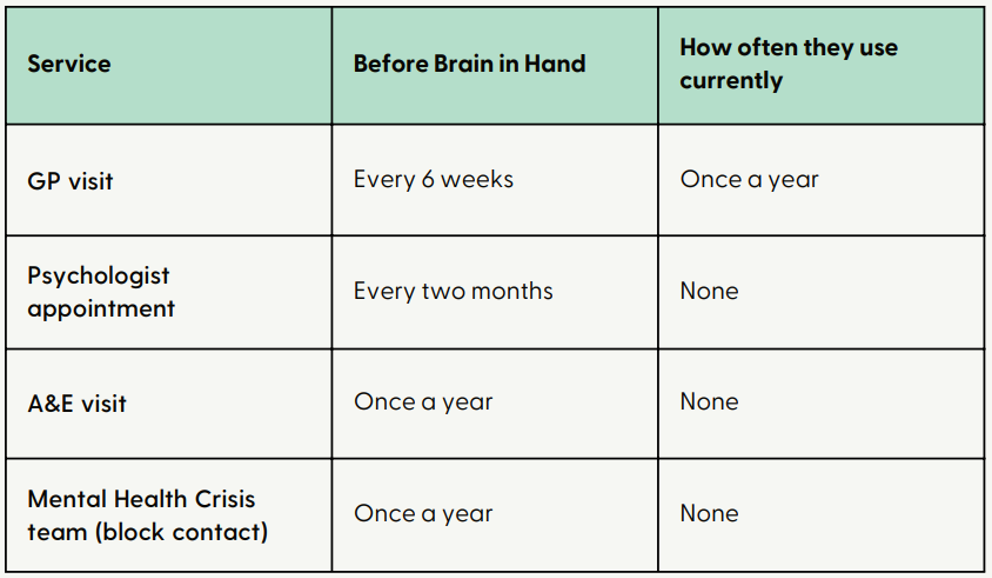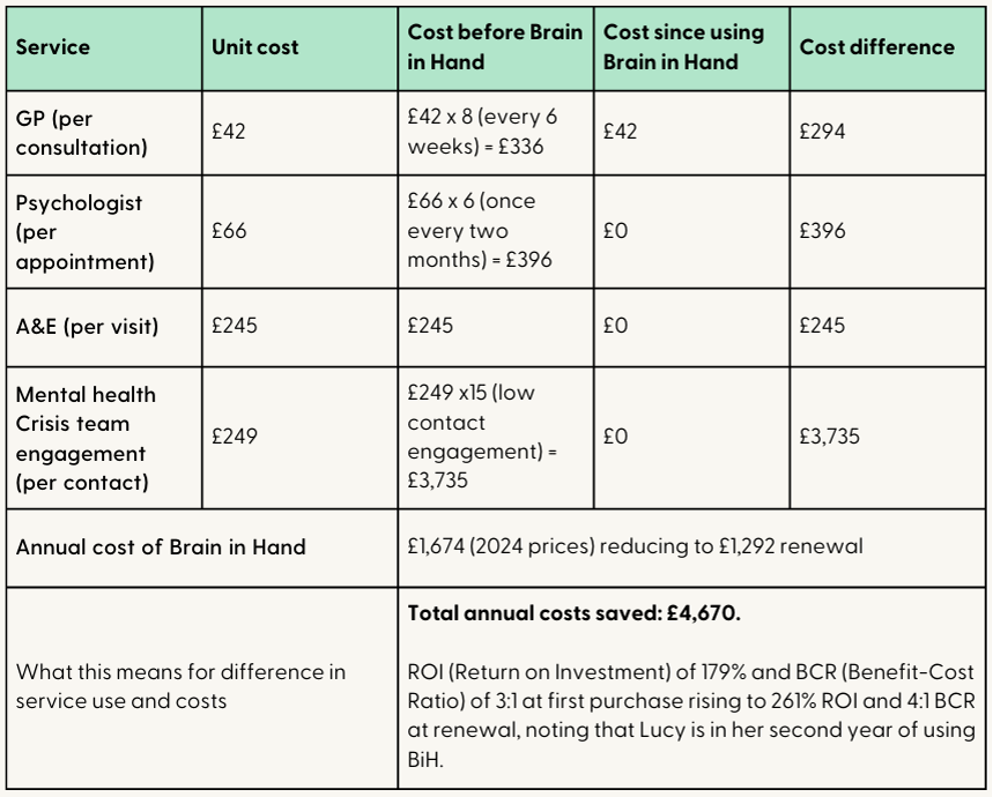Brain in Hand helps Lucy manage anxiety

Lucy has been using Brain in Hand since March 2022. She is employed part time, but usually finds herself working full-time hours due to the nature of her job.
Through using Brain in Hand, Lucy has developed a much better toolkit to manage her anxiety. The app's solution packs and information have helped her find healthier coping strategies.
Lucy found mornings to be difficult. Through coaching sessions with Brain in Hand, she learned to use reminders and plan her day more effectively. This has made her mornings less stressful and positively impacted her overall mental health.
Since using Brain in Hand, Lucy has become more independent in managing her needs. The traffic lights and mood tags help her self-regulate, allowing her to pinpoint specific areas where she needs support. This means she can approach her support network with clearer, more focused requests.
“It's reduced my reliance on them, and it's made my ability to have a more engaging conversation with them rather than just feeling like I'm offloading because I don't know how to cope.”
Lucy finds the red button in Brain in Hand especially helpful when she's approaching a crisis. The response team has a significant advantage because they can see Lucy's past conversations, support requests, and comments from previous responders. This information, along with ready access to events and solutions, allows them to provide the most effective support when Lucy needs it most.
To provide better service, coaches can access a person's account details and any specific requests they have made related to response service calls. This helps the agent tailor their approach. For example, a user may note that they are autistic or request that they not be asked to do breathing exercises.
Lucy explained that the difference with this service is that she doesn't have to constantly repeat her personal information. Unlike other services where the call handler is completely unaware of her situation, this one eliminates the exhausting and time-consuming task of providing details each time.
“Probably the most useful bit of it because my crises come quickly but they also pass really quickly and if I can just speak to someone in that moment of crisis it can de-escalate it really quickly… In the past when I didn't have access to anyone, it would just build and build and then I need proper help.
The amount of times I have pressed the red button has also gone down because I've known that I can [press it], and I know what's going to happen when I do and how they'll help. So, I think it’s decreased the mental health crises a lot just by being there.”
Without Brain in Hand, Lucy felt that would “almost definitely” be back under the care of the mental health team. In the past 15 years Lucy used the mental health crisis team as much as 10 times, with a similar number of A&E visits. It has been a difficult year for Lucy with many externalities playing factors with her mental health and without Brain in Hand, Lucy felt that she may have been in A&E for her mental health.
“It's saved so much NHS time, it's saved me the indignity of having to go through all of that and having to get that low and feel that alone and that takes so long to recover from. There is so much shame and guilt associated with that and it's brilliant.”
Table 1: Service use before Brain in Hand and since using Brain in Hand

What the findings tell us about averted costs and improved wellbeing
Since using Brain in Hand, Lucy has seen a significant decrease in the number of times she needs to visit her GP. She used to go every 6 weeks, but now only requires an annual appointment. This change translates to an estimated cost saving of £294.
Additionally, Lucy no longer needs to see a psychologist. Her previous appointments were every 2 months, and with the cost of an NHS psychologist at £66 per session, eliminating those visits saves a further £396.
Lucy has experienced significant benefits since using Brain in Hand. She has not needed to visit A&E or receive care from the Mental Health Crisis team. The red button feature has proven particularly valuable for Lucy, who has requested support 31 times since receiving her Brain in Hand license in March 2022. This response service is crucial in helping Lucy manage and avoid potential crises.
Considering Lucy's previous reliance on A&E and the mental health crisis team, and her own belief that she would be using these services again without Brain in Hand, it's reasonable to assume that Brain in Hand has prevented at least one A&E visit and a minimum of 15 contacts with the mental health crisis team over the past year.
Table 2: Annual cost breakdown for service use

Lucy indicated that Brain in Hand (BiH) could have significant economic impacts beyond the annual cost savings of £4,670 from reduced service access. She believes BiH helps her be more productive at work, arrive on time, and feel less stressed. Lucy feels that BiH is crucial to keeping her employed, and the potential savings for both her and the public could be substantial.
A recent analysis by Pro Bono Economics suggests economic benefits to an autistic person being in employment of around £9,000 in terms of increased earnings over and above government payments (Gomez and Sheikh, 2023).
There are indications that Lucy can also support her friends and family with their own mental health through the advice she gets from the response service, which could have knock-on effects for their use of services.
“I think it's helped me be able to support them a bit better as well because sometimes the advice the person on the red button gives me is really good and I'm like "that's interesting I could tell them that and they could use that when they're struggling as well" so I've found it is more of a reciprocal support network rather than me just going help help help which is really nice."
This sharing of information and the positive impact on others was also evident from conversations with Lucy about “Why do you think changes in services might have happened?” where she mentioned that she is also now teaching Mental Health first aid and sharing information on Brain in Hand with her students. This volunteer time to help others could be associated with opportunity costs.
"It's like having a friend in your pocket. It's really nice. It's made a huge difference to my life, it makes me feel a bit emotional talking about it, I can't tell you how scary it was to feel alone for so many years and know that you sometimes just need to talk to somebody about things to de-escalate things and not bother family, partner, all of those things, and you might not want them to know you're not feeling great."
"It's just so helpful to know there is somebody there who is being paid to listen because then you don't feel like you're bothering them, it's so valuable. I tell everyone about Brain in Hand. I was teaching MH first aid and I was showing all of my students."
The interview with Lucy indicated that there were annually cost savings to the NHS of at least £4,670 (a ROI of 179% in the first year and 261% in subsequent years) and that there may also be additional opportunity costs saved from her being in work and providing support to others in her free time.